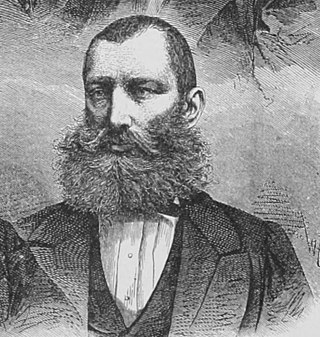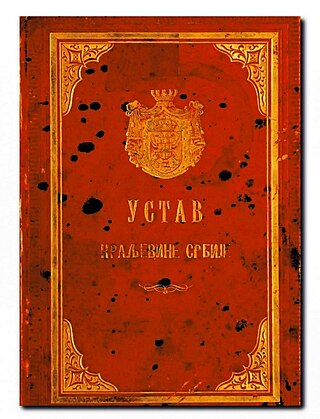 |
|---|
Parliamentary elections were held in Serbia on 17 September 1887 to elect the 156 elected members of the National Assembly, with a further 52 appointed by the king.
 |
|---|
Parliamentary elections were held in Serbia on 17 September 1887 to elect the 156 elected members of the National Assembly, with a further 52 appointed by the king.
Following the April 1886 elections a government was formed by Milutin Garašanin of the Serbian Progressive Party. However, it collapsed on 1 June 1887. [1] It was replaced by a new government consisting of the People's Radical Party and Liberal Party and led by Liberal Jovan Ristić. The new government's first action was to dissolve the National Assembly. A decree on 13 August set the election date as 17 September. [1]
The People's Radical Party won 81 seats and the Liberal Party 61, with the Progressives failing to win a seat. [2] Not all seats were filled and supplementary elections were held later. [1] The king appointed 36 Liberals and 16 Radicals to balance the result. [1]
Todor Tucaković was appointed president of the National Assembly and Paja Vuković as vice president. [1]
The coalition government led by Ristić remained in office until December, when it was replaced by a Radicals-only government headed by Sava Grujić. [2] A decree on 11 January 1888 dissolved the National Assembly and set early elections for March 1888. [1]

General elections were held in South Africa on 6 September 1989, the last under apartheid. Snap elections had been called early by the recently elected head of the National Party (NP), F. W. de Klerk, who was in the process of replacing P. W. Botha as the country's president, and his expected program of reform to include further retreat from the policy of apartheid. The creation of the Conservative Party had realigned the NP as a moderate party, now almost certain to initiate negotiations with the black opposition, with liberal opposition openly seeking a new constitutional settlement on liberal democratic and federalist principles.
The People's Radical Party was a populist political party in Serbia and later Yugoslavia. Led by Nikola Pašić for most of its existence, its ideological profile has significantly changed throughout its history, shifting from socialism and radicalism towards conservatism in the early 20th century.
Parliamentary elections were held in Serbia on 4 March 1888 to elect members of the National Assembly. The result was a "great triumph" for the People's Radical Party, which won a large majority of seats. Of the 142 seats in Parliament, supporters of Jovan Ristić won only 13.
Local elections were held in Serbia on 11 May 2008, concurrently with the 2008 Serbian parliamentary election and the 2008 Vojvodina provincial election. A re-vote was held at three poling stations in Belgrade on 18 May 2008 due to irregularities in the voting process.
Local elections were held in Kosovo on 11 May 2008, together with Serbia's parliamentary elections and elections in Vojvodina. UNMIK authorities have criticized Serbia organizing elections saying only the UN can organize elections in Kosovo. Kosovo's President Fatmir Sejdiu accused Serbia of trying to challenge Kosovo's statehood.
The Yugoslav Democratic Party, State Party of Serbian, Croatian and Slovene Democrats and Democratic Party, also known as the Democratic Union was the name of a series of liberal political parties that existed in succession in the State of Slovenes, Croats and Serbs and the Kingdom of Serbs, Croats and Slovenes.

Jovan Avakumović was a Serbian lawyer, criminologist, statesman, and Prime Minister of Serbia.

Sava Grujić was a Serbian politician, statesman, general, army officer, and author, serving five times as Prime Minister of the Kingdom of Serbia under two different monarchs from 1887 to 1906.
Local elections in Serbia were held on 6 May 2012. Pursuant to the Constitution of Serbia, the parliamentary Speaker signed on 13 March 2012 the Decision on calling the elections for councilors of municipal assemblies, town assemblies and the Belgrade City Assembly for 6 May 2012, with the exception of: the councilors of the municipal assemblies of Aranđelovac, Bor, Vrbas, Vrnjačka Banja, Knjaževac, Kovin, Kosjerić, Kosovska Mitrovica, Leposavić, Negotin, Novo Brdo, Odžaci, Peć, Prijepolje and Ruma and councilors of the Priština Town Assembly, which have already had extraordinary elections in the period from 2008 to 2012, while for councilors of the municipal assembly of Kula, the elections were already called earlier on 29 February 2012.
Parliamentary elections were held in Serbia on 26 April 1886 to elect members of the National Assembly.
Parliamentary elections were held in Serbia in early March 1893. Although the People's Radical Party had won a large majority in the 1889 elections, by 1893 a Liberal government led by Prime Minister Jovan Avakumović was in place.
Parliamentary elections were held in Serbia in April 1895. They followed a royal coup d'état by King Alexander in May 1894, in which he suspended the 1888 constitution and restored the 1869 constitution.
Parliamentary elections were held in Serbia on 12 December 1880 to elect members of the National Assembly. As expected, the elections resulted in a majority for the government, whose supporters won 94 seats, whilst Radicals won only 18 seats. By January 1881 the number of government supporters had risen to over 100, whilst the Radicals had split.

Radivoje Milojković was a Serbian politician. In the aftermath of Prince Mihailo's assassination in 1868, he served as Interior Minister under several Liberal governments of the 1870s and 1880s, as well as Prime Minister during the regency of Jovan Ristić, Milivoje Blaznavac and Jovan Gavrilović from 1869 to 1872. During this time, he was a close ally of Jovan Ristić.
A small number of municipalities in Serbia held local elections in 2009. These were not part of the country's regular cycle of local elections but instead took place in certain jurisdictions where either the local government had fallen or the last local elections for four-year terms had taken place in 2005.

The Constitution of the Kingdom of Serbia from 1888 was the fourth constitution of Serbia that was in use from 1889 to 1894. It was adopted by the Great National Assembly, at its session on January 2, 1889. In the Timok Rebellion of 1883, the conflict between the democratic aspirations of the masses and the absolutist aspirations of King Milan reached its climax. Numerous external and internal problems that called into question the future of the Obrenović dynasty on the throne forced the king to adopt that constitution.
Parliamentary elections were held in Serbia on 22 May 1901 to elect the members of the National Assembly. They were the first elections held under the 1901 constitution, which provided for a bicameral parliament consisting of a National Assembly and a Senate.
Parliamentary elections were held in Serbia on 23 May 1898 to elect members of the National Assembly. The result was a victory for the Liberal Party, which won 112 of the 194 seats.
Parliamentary elections were held in Serbia on 22 June 1897 to elect members of the National Assembly.
Parliamentary elections were held in Serbia on 14 September 1890 to elect members of the National Assembly. The result was a landslide victory for the People's Radical Party.